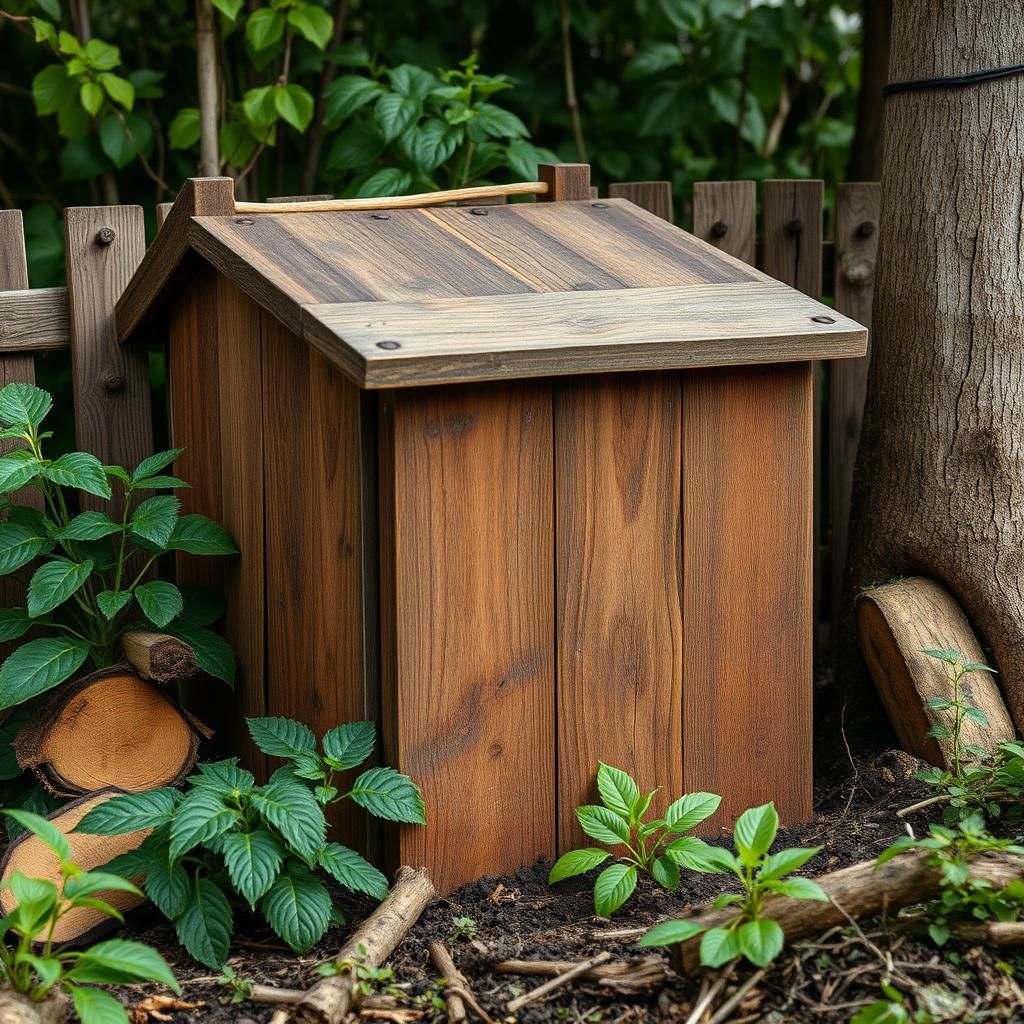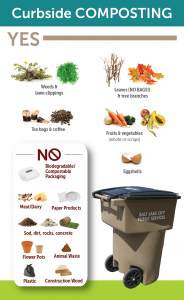Can Wood Go in the Compost Bin? Essential Tips for Composting Wood Safely

Composting is a fantastic way to recycle organic waste and enrich soil, but not all materials are suitable for the bin. Among the less understood components are wood products. While wood can be composted, it requires specific conditions and careful processing to break down effectively. This article explores the essential tips for composting wood safely, including the types of wood that are compostable, how to prepare it for composting, and the benefits it offers to your compost pile. By following these guidelines, you can ensure that your composting efforts are successful and environmentally friendly.
Can Wood Be Added to the Compost Bin?
Yes, wood can be added to your compost bin, but it is essential to consider the type and size of the wood pieces. Wood can take a long time to break down due to its dense structure and high carbon content. To effectively compost wood, it should be processed into smaller pieces, such as wood chips or sawdust, which will accelerate decomposition. Additionally, untreated natural wood is preferred over pressure-treated wood, as the latter can introduce harmful chemicals into the compost. Ultimately, using wood as a carbon-rich material can contribute to a healthy compost mix, provided it is combined with enough nitrogen materials, like grass clippings and kitchen scraps.
The Benefits of Adding Wood to Compost
Adding wood to your compost can provide several benefits. Firstly, it helps to create structure within the compost pile, allowing for improved aeration and drainage. This structure is crucial for maintaining an optimal environment for microbial activity, which is essential for decomposition. Additionally, wood is a great source of carbon, balancing the nitrogen from other compost materials and thus fostering a healthy composting ecosystem. As the wood breaks down over time, it can also contribute beneficial nutrients back into the soil.
Types of Wood Suitable for Composting
When selecting wood for composting, it's important to choose the right types. Untreated, natural wood is the best option, as it breaks down more easily and doesn't introduce harmful chemicals. Wood chips, sawdust, and small branches are ideal as they decompose faster than larger logs. Avoid using painted, stained, or pressure-treated wood, as these can contain toxic substances that may harm the compost and any subsequent plants. In general, hardwoods decompose slower than softwoods, so consider the type of wood and its condition when adding it to your compost bin.
Preparing Wood for Composting
Before adding wood to the compost, it's vital to prepare it properly to facilitate its breakdown. Start by cutting larger pieces of wood into smaller chunks or chips, as this increases the surface area available for microorganisms to work on. You can also mulch the wood to create even finer particles that will decompose more quickly. Mixing the wood with moist materials or nitrogen-rich items like kitchen scraps will further enhance its ability to compost effectively. The goal is to create a balanced mixture in your compost bin that encourages efficient decomposition.
Potential Issues with Wood in Compost
While wood can be beneficial, there are potential issues to consider. The biggest challenge is the slow decomposition process of larger wood pieces, which can lead to an imperfect composting environment if not balanced with nitrogen sources. Additionally, if too much wood is added, it can cause the pile to become too dry, slowing microbial activity and delaying the composting process. Regularly monitoring moisture levels and the overall mix of materials is crucial to prevent these problems and ensure a successful compost pile.
Monitoring Compost with Wood Additions
Monitoring the compost pile after adding wood is essential for achieving optimal decomposition. Keep an eye on the temperature and moisture levels; the pile should maintain a warm temperature to facilitate microbial activity. Turning the compost regularly will help mix the materials, aerate the pile, and promote even decomposition. It's also important to check for any foul odors or signs of insufficient breakdown, as this could indicate an imbalance in the composting mix. Adjusting the ratios of carbon (wood) to nitrogen (green materials) will help maintain a healthy compost environment.
| Type of Wood | Suitability | Decomposition Rate |
|---|---|---|
| Untreated wood chips | Very suitable | Fast |
| Sawdust | Very suitable | Fast |
| Small branches | Suitable | Moderate |
| Larger logs | Less suitable | Slow |
| Painted/stained wood | Not suitable | Variable |
Can wood go in a compost bin?
Yes, wood can be added to a compost bin, but it requires careful consideration regarding its size, type, and the process of decomposition. Generally, the incorporation of wood into composting systems can enhance the structure of the compost, improve aeration, and contribute valuable carbon content. However, there are specific guidelines to follow for successful composting when it comes to wood.
Types of Wood Suitable for Composting
When considering adding wood to your compost bin, selecting the right type is crucial. Here are some guidelines regarding suitable types of wood:
- Softwoods: These are generally better for composting as they decompose more quickly compared to hardwoods.
- Untreated Wood: Always avoid using treated or painted wood, as chemicals can leach into your compost.
- Chips or Shavings: Smaller pieces of wood, such as chips or shavings, will break down faster than larger pieces.
Preparing Wood for Composting
Before adding wood to the compost bin, preparing it properly can significantly enhance decomposition rates:
- Size Reduction: Cut, shred, or chip larger pieces of wood to allow for more surface area exposure.
- Layering: Mix wood with nitrogen-rich materials like grass clippings to balance the carbon-to-nitrogen ratio.
- Moisture Levels: Ensure wood is somewhat damp before adding it to the pile, as moisture aids in breaking down cellulose.
Slow Decomposition of Wood
Wood typically breaks down at a slower rate than other organic materials, which can affect the composting process:
- Carbon Content: Wood has a high carbon content, which requires a balance with higher nitrogen materials for effective composting.
- Time Factor: Expect longer decomposition times, especially for larger pieces of hardwood.
- Monitoring the Pile: Regularly turn the compost pile to promote aeration and even breakdown.
Potential Problems with Wood in Compost
While adding wood can have its benefits, it can also present some challenges:
See also:
- Imbalance in Nutrients: Too much wood can lead to a carbon-heavy compost, stalling the decomposition process.
- Pests and Odors: Larger pieces of wood can attract pests or create odors if not properly managed.
- Fungal Growth: Wood can sometimes harbor fungi that could disrupt the composting process if not monitored.
Wood Alternatives for Composting
If you're hesitant about adding wood to your compost bin, consider some alternative materials:
- Cardboard: Shredded cardboard is an excellent carbon source and decomposes faster than even smaller pieces of wood.
- Leaves: Dry leaves can add bulk and help balance the compost while breaking down quicker than wood.
- Paper Products: Non-glossy paper products can be added as a carbon source similar to wood.
Can you throw wood in the compost bin?

Yes, you can throw wood in the compost bin, but there are important considerations to keep in mind. Wood, in the form of small branches, sticks, and leaves, can take a long time to decompose compared to other organic materials. It is crucial to ensure that the wood pieces are appropriately sized and untreated to promote efficient composting.
When adding wood to your compost bin, keep in mind the following aspects:
Types of Wood Suitable for Composting
Adding wood to your compost bin is permissible when you choose the right types. Here are some guidelines:
- Small Branches and Twigs: These should be no larger than one inch in diameter. Their smaller size allows for faster decomposition.
- Wood Chips or Sawdust: These materials decompose more quickly and provide excellent aeration in the compost.
- Untreated Wood: Always use untreated wood to avoid introducing harmful chemicals into your compost.
How to Prepare Wood for Composting
Properly preparing the wood before adding it to the compost bin can enhance the composting process. Follow these steps:
- Shred or Chop: Break down larger pieces of wood into smaller chunks or chips to accelerate decomposition.
- Mix with Other Materials: Combine wood with nitrogen-rich materials like grass clippings or vegetable scraps for balanced composting.
- Monitor Moisture Levels: Wood can absorb moisture; ensure your compost remains damp but not soggy.
Potential Issues with Composting Wood
While wood can be composted, it poses specific challenges that may arise:
- Decomposition Time: Wood decomposes much slower compared to kitchen scraps, leading to longer composting times.
- Airflow Problems: Large pieces can create compact areas in the compost, hindering airflow and effective composting.
- Pests and Disease: If not correctly sourced, wood can harbor pests or diseases that may affect your compost.
Alternatives to Composting Wood
If you decide that composting wood is not suitable for your bin, there are alternative options to consider:
- Wood Chips in Mulching: Use wood chips around plants as mulch to retain moisture and suppress weeds.
- Green Waste Recycling: Check local programs for wood recycling or disposal options.
- Burning or Curbside Pickup: In some areas, burning or designated pickups for yard waste may be available.
Best Practices for Composting with Wood
Implementing best practices will help you effectively compost wood materials:
- Maintain a Balanced Mix: Ensure a good carbon-to-nitrogen ratio to promote effective decomposition.
- Regular Turning: Turn your compost regularly to aerate the materials and distribute moisture evenly.
- Patience: Be prepared for a longer composting period and periodically check the progress.
Why is wood not compostable?

Wood is not typically considered compostable due to several inherent characteristics that impact its decomposition process. While wood is organic, its composition and structure make it challenging for traditional composting methods to break it down effectively. Here are several reasons why wood is not compostable, along with related subtopics.
Understanding the Composition of Wood
Wood is primarily composed of lignin, cellulose, and hemicellulose. These components possess different rates of decomposition when exposed to microbial activity in compost.
- Lignin: This compound provides rigidity to wood and is resistant to degradation, significantly slowing down the composting process.
- Cellulose: While more biodegradable than lignin, cellulose still takes a considerable amount of time to break down compared to softer organic materials.
- Hemicellulose: This component is somewhat easier to compost, but it still does not allow for rapid decomposition when combined with the other two components.
The Role of Microorganisms in Decomposition
Microorganisms are essential for the breakdown of organic matter during composting. The effectiveness of these microorganisms can be hindered by wood's structure.
See also:
- Decomposition Rate: Wood requires specialized microorganisms that can effectively break down lignin and cellulose.
- Community Dynamics: These specialized microbes often take longer to establish, creating an imbalance in the microbial community necessary for effective composting.
- Oxygen Availability: Dense and bulky wood can restrict airflow in compost piles, impacting overall microbial activity and slowing decomposition.
Size and Density of Wood
The physical characteristics of wood, including its size and density, make it unsuitable for traditional composting.
- Large Pieces: When added to compost, large wood pieces can take years to break down, rendering the composting process inefficient.
- Density: The higher density of wood compared to other compostable materials means it decomposes more slowly and requires additional resources to break down.
- Chopping and Shredding: While smaller, shredded pieces of wood can compost faster, they still require additional nitrogen sources to accelerate the process.
Potential Chemical Additives in Treated Wood
Certain types of wood, especially treated wood, may contain harmful chemicals that complicate composting.
- Pesticides: Many treated woods use pesticides that can leach into the compost, rendering it unsafe for garden use.
- Preservatives: Chemicals such as chromated copper arsenate (CCA) can contaminate the compost and harm soil health.
- Pollution Impact: The accumulation of chemicals can affect the microbes responsible for decomposition, inhibiting the composting process.
Alternative Uses for Wood
Due to its non-compostable nature, wood is often better suited to other sustainable uses.
- Mulching: Shredded wood can be used as mulch, helping to retain soil moisture without the need for composting.
- Building Material: Salvaged and untreated wood can be repurposed for construction projects, reducing waste.
- Bioenergy Production: Wood can be used as a biomass fuel source, providing energy through combustion or gasification techniques.
What not to put in compost bins?
When composting, it's essential to know what materials are suitable for the compost bin and which ones should be avoided. Certain items can disrupt the composting process or introduce harmful pathogens and chemicals. Below is a detailed guide on what not to put in compost bins.
Non-Biodegradable Materials
Non-biodegradable materials include items that do not decompose naturally and can remain in the environment for a long time. These should be avoided in compost bins for several reasons:
- Plastic: Many plastics do not break down and can contaminate the compost.
- Styrofoam: This material is made from non-biodegradable substances and can disrupt the composting process.
- Glass and Metal: Similar to plastics, these materials do not decompose and can damage composting equipment.
Meat and Dairy Products
Including meat and dairy in compost bins is generally discouraged due to potential issues:
- Odor Issues: Decomposing meat and dairy can produce unpleasant smells that attract pests.
- Pathogen Risk: These foods can harbor bacteria that may be harmful to humans.
- Pest Attraction: The strong scent of meat and cheese can attract animals such as rodents and raccoons.
Certain Oils and Fatty Foods
While some oils can be composted in small quantities, larger amounts or certain types should be avoided:
- Animal Fats: These can make the compost greasy and foul-smelling.
- Processed Oils: Oils that have undergone processing contain chemicals that may not break down effectively.
- Butter and Margarine: Similar to animal fats, these products can lead to pest problems and unpleasant odors.
Pesticides and Chemicals
Materials treated with pesticides or chemicals can introduce harmful substances to your compost:
- Chemically Treated Wood: Lumber that has been treated with chemicals can leach into compost.
- Pesticide-Covered Plant Material: Using plants that have been treated can contaminate the finished compost.
- Industrial Waste: These materials may contain toxic substances detrimental to soil health.
Weeds and Invasive Plants
Certain weeds and invasive plant species should be excluded from compost due to their potential to spread:
- Seed-Heavy Weeds: Weeds that produce a large number of seeds can thrive if not fully composted.
- Invasive Plants: Species known for aggressive growth can take over gardens if introduced via compost.
- Diseased Plants: Including diseased plant material can perpetuate diseases in the garden.
Questions from Our Readers
Can all types of wood be composted?
Not all types of wood can be composted. Generally, it's best to use untreated, natural wood like branches and twigs from trees. Avoid using pressure-treated or painted wood, as these may contain harmful chemicals that can leach into the compost.
How should wood be prepared for composting?
To prevent decomposition issues, it's important to shred or chop wood into smaller pieces before adding it to the compost bin. Smaller pieces have a greater surface area and will break down more quickly, aiding in the overall composting process.
How long does it take for wood to decompose in compost?
The decomposition of wood in compost can take a considerable amount of time, often ranging from several months to a few years, depending on the size of the wood pieces and the composting conditions. Regularly turning the compost can help speed up the process.
See also:
Can wood chips be added to compost?
Yes, wood chips can be added to compost, but they should be used in moderation due to their high carbon content. Balancing wood chips with nitrogen-rich materials, such as kitchen scraps or grass clippings, is essential for maintaining an effective composting environment.

If you want to read more articles like Can Wood Go in the Compost Bin? Essential Tips for Composting Wood Safely, we recommend you check out our Compost category.
Leave a Reply


Related Articles